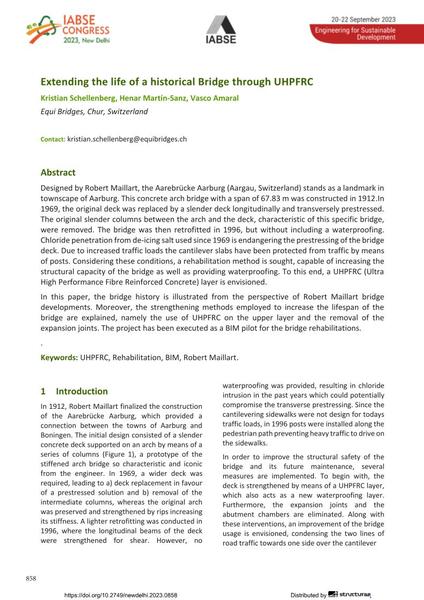Extending the life of a historical Bridge through UHPFRC

|
|
|||||||||||
Bibliografische Angaben
| Autor(en): |
Kristian Schellenberg
(Equi Bridges, Chur, Switzerland)
Henar Martin-Sanz (Equi Bridges, Chur, Switzerland) Vasco Amaral (Equi Bridges, Chur, Switzerland) |
||||
|---|---|---|---|---|---|
| Medium: | Tagungsbeitrag | ||||
| Sprache(n): | Englisch | ||||
| Tagung: | IABSE Congress: Engineering for Sustainable Development, New Delhi, India, 20-22 September 2023 | ||||
| Veröffentlicht in: | IABSE Congress New Delhi 2023 | ||||
|
|||||
| Seite(n): | 858-865 | ||||
| Anzahl der Seiten (im PDF): | 8 | ||||
| DOI: | 10.2749/newdelhi.2023.0858 | ||||
| Abstrakt: |
Designed by Robert Maillart, the Aarebri..cke Aarburg {Aargau, Switzerland) stands as a landmark in townscape of Aarburg. This concrete arch bridge with a span of 67.83 m was constructed in 1912.In 1969, the original deck was replaced by a slender deck longitudinally and transversely prestressed. The original slender columns between the arch and the deck, characteristic of this specific bridge, were removed. The bridge was then retrofitted in 1996, but without including a waterproofing. Chloride penetration from de-icing salt used since 1969 is endangering the prestressing of the bridge deck. Due to increased traffic loads the cantilever slabs have been protected from traffic by means of posts. Considering these conditions, a rehabilitation method is sought, capable of increasing the structural capacity of the bridge as well as providing waterproofing. To this end, a UHPFRC {Ultra High Performance Fibre Reinforced Concrete) layer is envisioned. In this paper, the bridge history is illustrated from the perspective of Robert Maillart bridge developments. Moreover, the strengthening methods employed to increase the lifespan of the bridge are explained, namely the use of UHPFRC on the upper layer and the removal of the expansion joints. The project has been executed as a BIM pilot for the bridge rehabilitations. . |
||||
| Stichwörter: |
Instandsetzung BIM UHPFRC
|
||||
